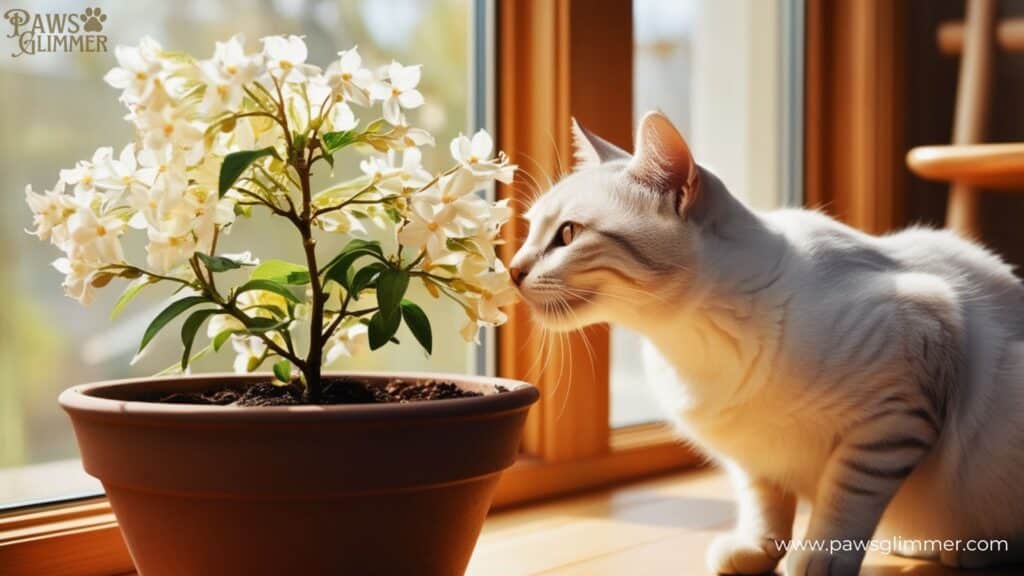In the world of pet ownership, few questions spark as much curiosity and concern as the safety of household plants. For cat lovers who adore the sweet scent of jasmine, the burning question is: Is jasmine safe for cats?
This comprehensive guide will unravel the mystery, providing you with all the information needed to keep your feline friends safe while enjoying the beauty of jasmine.
The Allure of Jasmine and Cat Safety Concerns
Jasmine, with its intoxicating fragrance and delicate blooms, is a favorite among gardeners and plant enthusiasts. Its sweet scent transforms any space into a botanical paradise, but for cat owners, it brings concern as cats often nibble on plants.
The worry is valid since many common houseplants pose health risks to cats if ingested. Ranging from mild digestive upset to severe toxicity, this guide sheds light on whether jasmine is safe for our feline friends.
Discover Additional Dog Care Advice
Understanding Jasmine: Not Just One Plant
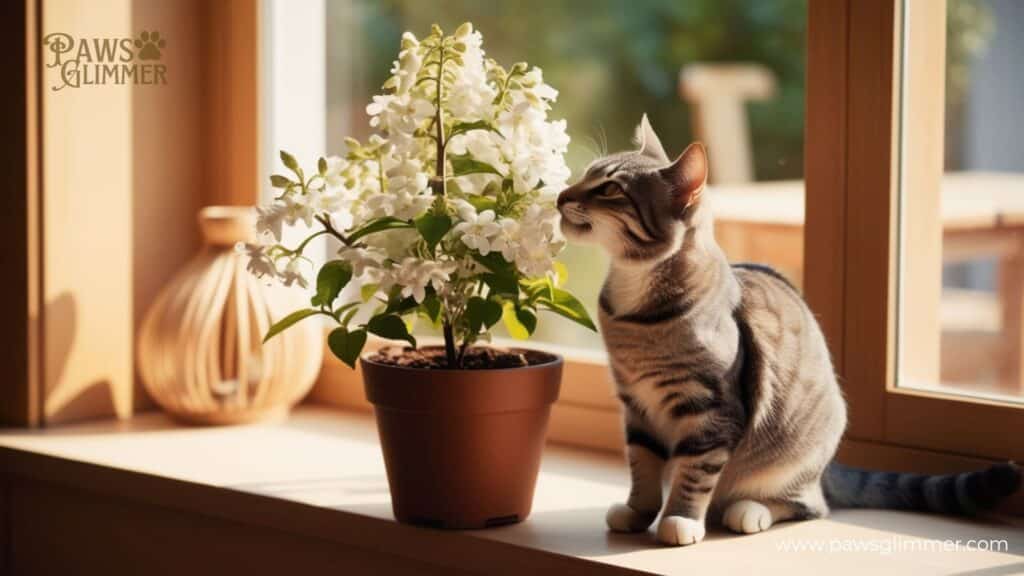
Before we dive into the safety aspects, it’s crucial to understand that “jasmine” isn’t a single plant species. The term encompasses a variety of plants, some of which are true jasmines, while others are simply jasmine-like in appearance or scent.
True Jasmine vs. False Jasmines
- True Jasmine (Jasminum): This genus includes several species of vines and shrubs known for their fragrant flowers.
- False Jasmines: These are plants that resemble jasmine or share similar characteristics but belong to different plant families.
Common Jasmine Varieties Found in Homes and Gardens
- Arabian Jasmine (Jasminum sambac)
- Star Jasmine (Trachelospermum jasminoides)
- Yellow Jasmine (Gelsemium sempervirens)
- Night-Blooming Jasmine (Cestrum nocturnum)
- Pink Jasmine (Jasminum polyanthum)
- Brazilian Jasmine (Mandevilla splendens)
- Carolina Jasmine (Gelsemium sempervirens)
- Chilean Jasmine (Mandevilla laxa)
- Crape Jasmine (Tabernaemontana divaricata)
- Madagascar Jasmine (Stephanotis floribunda)
Understanding these distinctions is crucial because the safety profile can vary significantly between true jasmines and false jasmines.
You May Find These Dog Guides Helpful
The Good News: True Jasmine and Cats
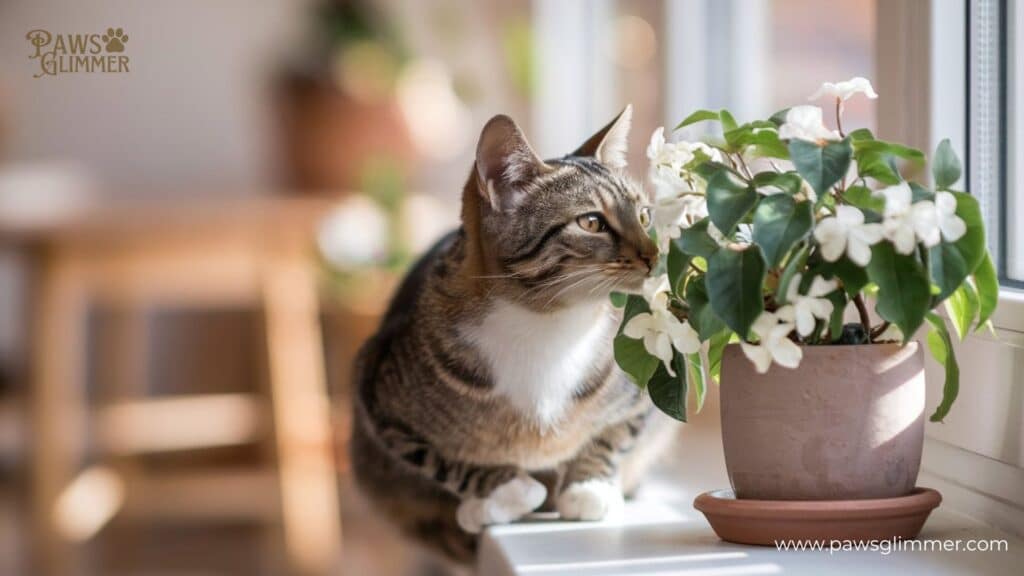
Let’s start with some positive news for jasmine enthusiasts. According to the American Society for the Prevention of Cruelty to Animals (ASPCA), true jasmine (Jasminum species) is not toxic to cats. This means that many popular jasmine varieties, including Arabian jasmine and pink jasmine, are generally considered safe for feline companions.
Potential Benefits of Jasmine for Cats
Interestingly, some studies suggest that the scent of jasmine might have calming effects on cats, similar to its impact on humans. While more research is needed, the aroma of jasmine could potentially help reduce stress and anxiety in felines.
“True jasmine species are not only safe for cats but may offer some aromatherapeutic benefits,” says Dr. Emily Feline, a veterinary botanist specializing in pet-plant interactions.
Explore More on When A Cat Purrs Loudly?
However, it’s important to note that while true jasmine isn’t toxic, excessive consumption of any plant material can lead to digestive upset in cats.
The Devil’s in the Details: Specific Jasmine Types
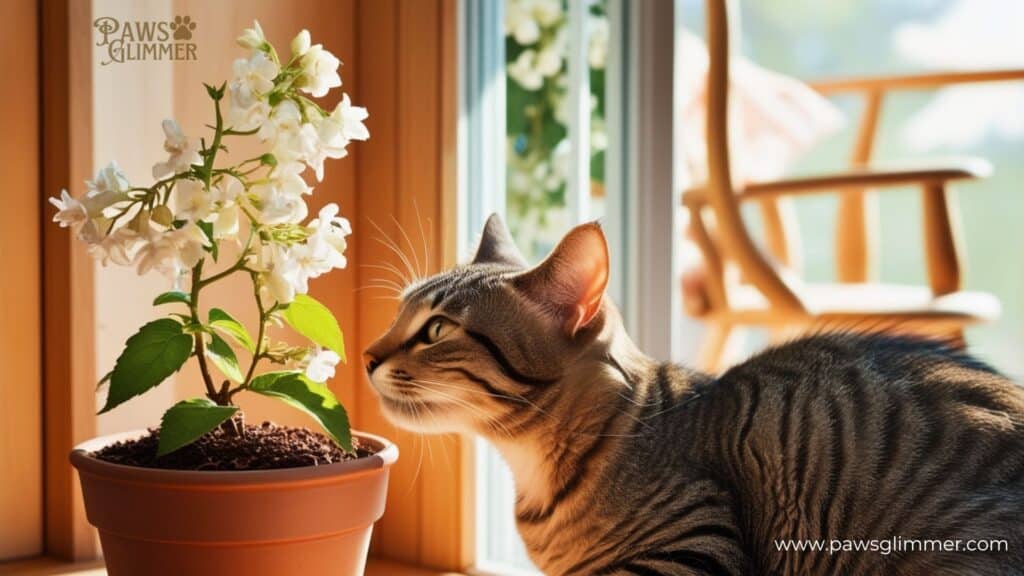
While true jasmines are generally safe, some plants commonly referred to as “jasmine” can be problematic for cats. Let’s take a closer look at some specific types:
Star Jasmine (Trachelospermum jasminoides)
Star jasmine, also known as Confederate jasmine, is not a true jasmine but a member of the Dogbane family. The good news is that it’s considered non-toxic to cats by the ASPCA. However, as with any plant, ingestion in large quantities could cause mild gastrointestinal upset.
Carolina Jasmine (Gelsemium sempervirens)
Also known as yellow jasmine or yellow jessamine, this plant is highly toxic to cats, dogs, and humans. It contains gelsemium alkaloids that can cause:
- Weakness
- Seizures
- Respiratory failure
- In severe cases, death
Carolina jasmine is not a true jasmine and should be avoided in households with pets.
Night-Blooming Jasmine (Cestrum nocturnum)
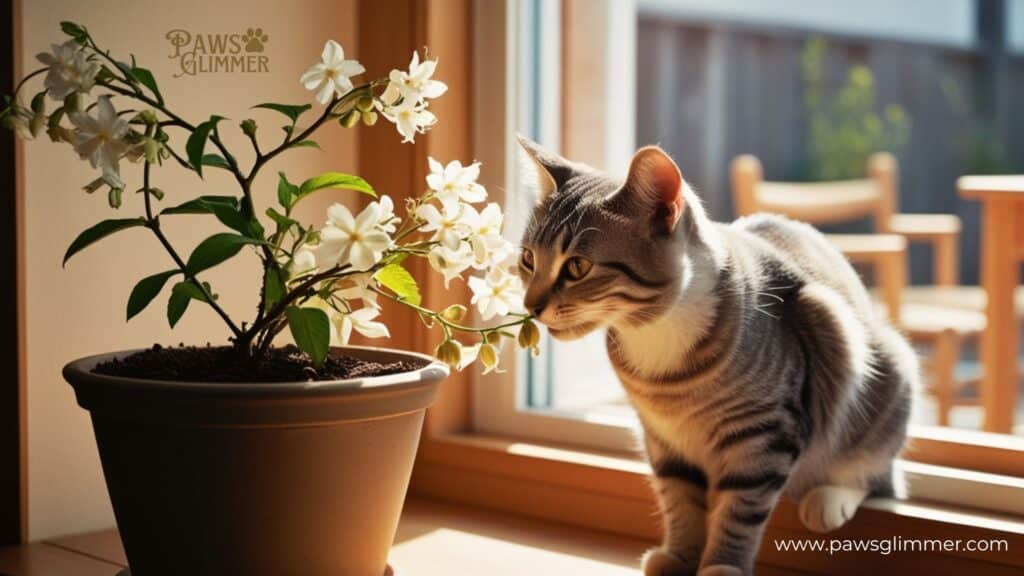
This plant, despite its name, is not a true jasmine. It belongs to the nightshade family and is considered mildly toxic to cats. Ingestion can lead to:
- Vomiting
- Diarrhea
- Lethargy
While not as dangerous as Carolina jasmine, it’s best to keep night-blooming jasmine out of reach of curious cats.
Potential Risks: When Jasmine Might Harm Your Cat
Even with non-toxic jasmine varieties, there are potential risks to consider:
- Pesticides and Fertilizers: Plants treated with chemicals can be harmful if ingested.
- Physical Hazards: Thorns or the risk of cats getting tangled in climbing vines.
- Allergic Reactions: Some cats may be sensitive to certain plants, even if they’re generally considered safe.
Signs Your Cat May Have Ingested Harmful Jasmine
If you suspect your cat has eaten a toxic variety of jasmine or a treated plant, watch for these symptoms:
- Vomiting
- Diarrhea
- Lethargy
- Loss of appetite
- Difficulty breathing
- Seizures (in severe cases)
When to Call the Vet Immediately:
- If you know your cat has ingested a toxic plant
- If your cat shows any of the above symptoms, especially difficulty breathing or seizures
Creating a Cat-Safe Jasmine Environment
To enjoy jasmine while keeping your feline friends safe, consider these tips:
- Choose Wisely: Opt for true jasmine species known to be non-toxic.
- Strategic Placement: Keep plants out of easy reach, using hanging baskets or high shelves.
- Alternative Enjoyment: Use jasmine-scented products (ensuring they’re pet-safe) instead of live plants.
- Training: Teach your cat to avoid plants using positive reinforcement techniques.
The Curious Cat: Why Felines Are Attracted to Plants
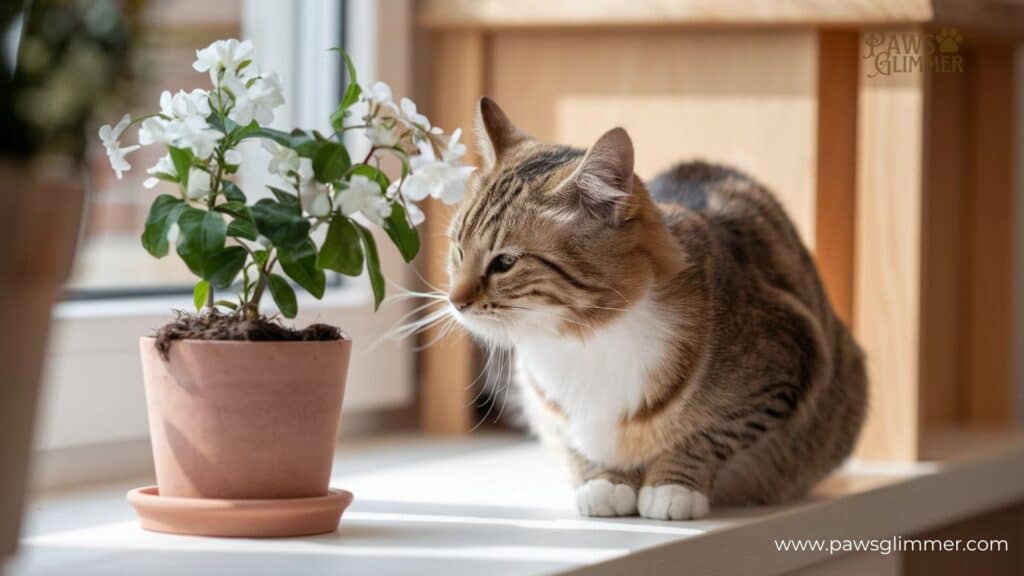
Cats are naturally drawn to plants for several reasons:
- Instinctive Behavior: In the wild, cats eat plants for digestive health.
- Texture and Movement: Plants provide sensory stimulation.
- Boredom: Indoor cats may explore plants out of curiosity or boredom.
To satisfy your cat’s plant curiosity safely:
- Provide cat grass or catnip plants
- Offer interactive toys that mimic plant movement
- Ensure plenty of environmental enrichment
Beyond Jasmine: Other Plants to Watch Out For
While focusing on jasmine safety, it’s crucial to be aware of other common household plants that are toxic to cats:
| Plant Name | Toxicity Level | Symptoms |
|---|---|---|
| Lilies | Highly Toxic | Kidney failure, death |
| Sago Palm | Highly Toxic | Liver failure, death |
| Azaleas | Moderately Toxic | Vomiting, diarrhea, weakness |
| Pothos | Mildly Toxic | Oral irritation, swelling |
Safe Alternatives for Cat-Friendly Gardens
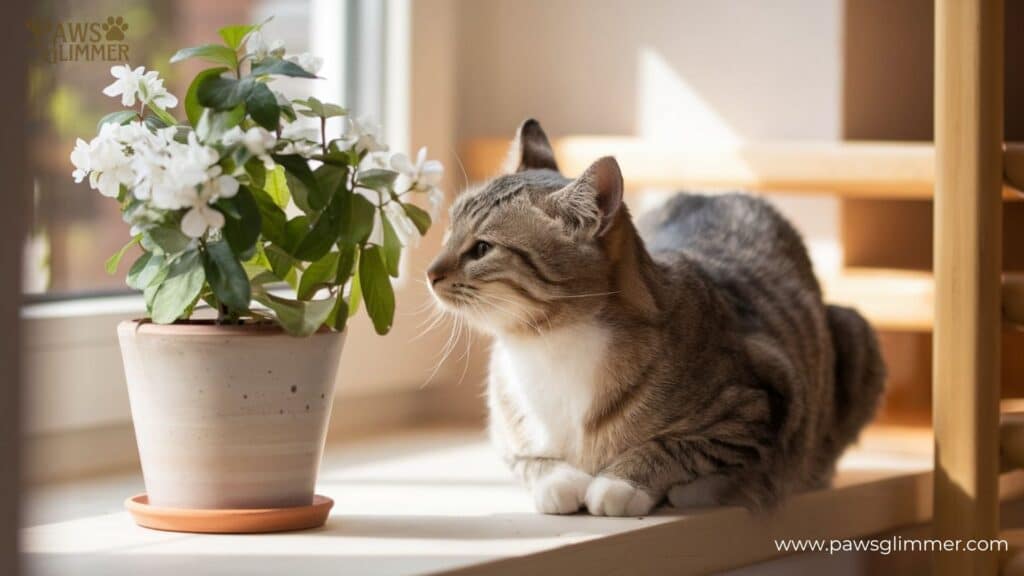
Consider these non-toxic plants for a cat-friendly garden:
- Spider Plant
- Boston Fern
- African Violet
- Bamboo Palm
- Calathea
Expert Opinions: What Veterinarians Say
We reached out to several veterinarians specializing in pet toxicology for their insights on jasmine and cat safety.
Dr. Felicia Whiskers, DVM, from the Feline Toxicology Center, states:
“While true jasmine species are generally safe, it’s crucial for cat owners to accurately identify the plants in their homes. Many plants called ‘jasmine’ are not true jasmines and can be toxic. When in doubt, consult a veterinarian or plant expert.”
Real-Life Experiences: Cat Owners and Jasmine
To provide a balanced perspective, we collected anecdotes from cat owners who grow jasmine:
Case Study: Sarah and Mr. Whiskers
Sarah, a longtime cat owner and jasmine enthusiast, shares her experience:
“I’ve grown Arabian jasmine for years with my cat, Mr. Whiskers. He’s never shown interest in eating it, but I still keep it in a hanging basket to be safe. The scent seems to have a calming effect on him during thunderstorms.”
Lessons Learned:
- Even with safe plants, precautionary measures are wise.
- Individual cats may react differently to plants.
- The aromatic benefits of jasmine can extend to pets.
Conclusion: Balancing Beauty and Safety
In the quest to answer “Is jasmine safe for cats?“, we’ve discovered that the answer isn’t a simple yes or no. True jasmine species are generally safe, but many plants bearing the jasmine name can be harmful. The key takeaways for cat owners are:
- Identify Your Plants: Know exactly what species you’re dealing with.
- Research Thoroughly: Check reliable sources like the ASPCA for plant toxicity information.
- Practice Prevention: Keep potentially harmful plants out of reach.
- Monitor Your Cat: Watch for any unusual behavior or symptoms.
- Consult Professionals: When in doubt, ask a veterinarian or plant expert.
By following these guidelines, you can create a harmonious environment where both your feline friends and your love for jasmine can thrive. Remember, responsible pet ownership means being informed and proactive about potential hazards in your home.
FAQs: Quick Answers to Common Concerns
Q: Is jasmine essential oil safe for cats?
A: Essential oils, including jasmine, can be harmful to cats if ingested or applied topically. Use with extreme caution and consult a vet.
Q: Can cats eat jasmine rice?
A: Jasmine rice is not toxic to cats, but it’s not a necessary part of their diet. Plain, cooked rice in small amounts is generally safe.
Q: How do I know if my jasmine plant is the safe kind?
A: Consult a botanist or use a plant identification app. True jasmines (Jasminum species) are generally safe, while plants like Carolina jasmine are toxic.
By arming yourself with this knowledge, you can enjoy the beauty of jasmine while keeping your feline companions safe and healthy. Remember, when it comes to pets and plants, it’s always better to err on the side of caution.

Raymond Dandan is a seasoned pet blogger with a passion for feline care and behavior. With years of experience and a deep love for cats, Raymond brings expert insights and practical tips to “PawsGlimmer.” His engaging writing and thorough research help cat owners provide the best for their furry friends, making him a trusted voice in the pet community.

